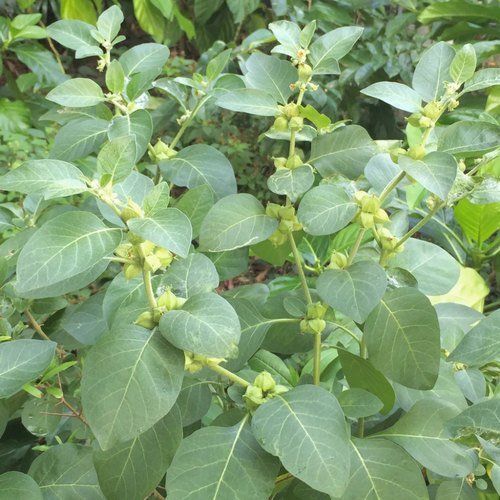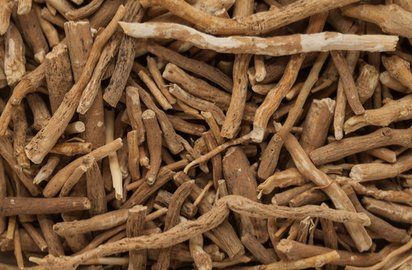In Ayurveda, it is known as 'Rasayana' meaning rejuvenating or that which gives rasa. It’s the best rejuvenating herb and has traditionally been prescribed to help people strengthen their immune system after an illness. It works particularly on the muscles, marrow and for Vata constitution. It nourishes the nervous system (and so the mind) and enhances energy and strength. Ashwagandha belongs to the Solanaceae, or nightshade, family—the same family as tomatoes, eggplant and potatoes. It holds a place in the Ayurvedic pharmacy similar to ginseng in Chinese medicine.
Ashwagandha: The Indian Ginseng
This chill-out herb seems to be in everyone’s supplement stash. Why? It helps us thrive in the modern world. Here in the West, we’re just getting familiar with it, though Ashwagandha has stood the test of time: it has been used for centuries in Chinese and Ayurvedic healing traditions to not only manage stress-related conditions but also help with chronic
fatigue, insomnia and adrenal fatigue.
In Ayurveda, traditionally, organic ashwagandha has been prescribed as a nerve tonic and adaptogen—an agent which helps the body adapt to various emotional and physical stressors. It has classically been used in India for nearly 5,000 years for conditions such as
- Rheumatism
- Constipation
- Insomnia
- Nervous conditions
- Chronic stress
- Goiter
- Joint inflammation
- Parasites
- Hormone balance
A paste made from the ashwagandha root powder can be applied topically to treat boils, ulcers, and other skin irritations and infections.
The ‘re-charging’ power
Feeling overwhelmed? Anxious? On edge? Nothing unfamiliar nowadays, but it doesn’t mean you ‘just have to deal with it’. Instead, it’s a clear sign that your body and mind need support and balance. Ashwagandha replenishes your storehouse of energy so you can be productive, and focussed without pushing it as sharp as coffee does. The warming qualities of Ashwagandha make it the perfect support to the rough, mobile and cold qualities of our go-go-go mentality and quick pace of living. It helps you overcome fatigue when you are feeling worn-out and exhausted and brings relaxation after a stressful day.
Adaptogens aka herbal pharmaceuticals.
Improved sleep
Ashwagandha what about it’s Latin name: Withania somnifera. Somnifera means sleep-inducing in Latin, showcasing another helpful quality. It is calming and promotes deep, dreamless sleep, according to dr. David Frawley. By nourishing and strengthening a weakened and over-anxious nervous system, it can help you relax and drift off into sleep even while thoughts keep swirling in your mind. It might also improve the quality of your sleep.
Reproductive boost
The legend goes that Ashwagandha - it’s Sanskrit name that translates as ‘the strength of a horse’ - bestows the vitality and sexual energy of a horse on the person who is taking it.This herb can also have benefits when it comes to libido and fertility. Ashwagandha is used by both men and women as a reproductive tonic, but it is specifically known for revitalizing the male reproductive system. It can increase sperm count and sperm motility. The root powder will be mixed with honey and ghee.
Pregnancy
Ashwagandha is good for pregnant women as it helps to stabilize the fetus. It also regenerates the hormonal system. After birth, it is important to take extra care of the nervous system. This can be through abhyanga (applying oil to the body), but also by taking good herbs like Ashwagandha. Ashwagandha is your best friend for at least the first 6-12 months after giving birth. To strengthen the nervous system, the whole physical body and the mind, giving it much more relaxation and stability. It works for the mom and dad!
If you are curious about how Ashwagandha can help with your health and wellbeing, it is best to consult an Ayurveda Practitioner before. Although it’s a great example of a herb that can be taken for longer periods of time when consumed in moderate doses, that doesn’t mean you should drink your oat milk latte with Ashwagandha for the rest of your life. One of the best ways to consume Ashwagandha is by drinking it with warm milk. Vata types can sweeten their ashwagandha milk with some maple syrup or raw sugar and add a pinch of nutmeg to enhance its sleep-inducing properties. Kapha types, for you it’s best to add some honey and cardamom or pippali. People with a Pitta Prakriti or serious Pitta imbalances should be careful.
Another simple way is to make your own herbal tea. Take a teaspoon of its powder and add it to a cup of warm water, boiled for 3-5 minutes. Filter and drink. If you wish, you can add other healthy herbs such as ginger, long pepper or cinnamon. Or take the capsules (1 tablet once or twice a day), before or after food. Some people feel a burning sensation when it’s consumed before eating or on an empty stomach. In that case, it’s best to take it 30 minutes after food. It’s better NOT to take Ashwagandha in cases of high Ama, excess Pitta, congestion or low energy due to Kapha dosha.
Curious about Dosha's? Doshas are at the center of Ayurveda's approach to health. There are three Doshas—Vata, Pitta, and Kapha—each derived from the 5 elements and representative of a blend of physical, emotional, and mental characteristics present in every individual. Take this quiz to gather more information about your Dosha to create healthier habits for your well-being.
Sources: The Yoga of Herbs by Dr David Frawley, Easy Ayurveda














